LiveGood Products Review: My Honest 18-Month Experience as a Member
After eighteen months as a LiveGood member and daily user of their products, I wanted to share my genuine LiveGood products review with you. I’ll be upfront: I am a member and I do genuinely enjoy these products, but I’ll do my best to give you an honest, balanced perspective that includes both what works well and where there’s room for improvement.
If you’re searching for a comprehensive LiveGood products review from someone who actually uses these supplements daily, you’re in the right place.
“Disclosure: I am an affiliate marketer. As a result, there may be some affiliate links below, but these are all products I highly recommend. I won’t put anything on this page that I haven’t verified and/or personally used. I get commissions for purchases made through links on this page. Please read my complete AFFILIATE DISCLOSURE policy for more info.”
My Journey to LiveGood: Why I’m Writing This LiveGood Products Review
When it comes to health supplements, the internet is full of hype — and when a company also has an affiliate program, people either blindly promote it or harshly criticize it. That’s why I wanted to give you the full, honest LiveGood Products Review for 2025.
Like many people, I was initially skeptical when I first heard about LiveGood. The MLM structure gave me pause—I’ve seen too many friends get burned by business opportunities that promised more than they delivered. However, I was spending nearly $150 monthly on supplements from various brands, and the wholesale pricing model caught my attention. I decided to try it strictly for personal use, and I’m glad I did.
This LiveGood products review is based on my real experience with their supplements over eighteen months, not just a few weeks of testing. I’ve been working online since 2006, and I’ve tried countless programs, supplements, and opportunities. I’m not here to sugarcoat anything. I’m a LiveGood member and affiliate, and I personally use many of their supplements. Some I love, some I had to stop using.
The Membership Investment: Is It Worth It?
Let me address this right away because it’s the first hurdle for most people. Yes, there’s a $9.95 monthly membership fee (or $49.95 if you just want products without the affiliate aspect). I’ll be honest—if you’re only planning to buy one bottle of something every few months, this probably isn’t for you. You’d be better off buying supplements when they’re on sale elsewhere.
However, if you’re like me and take multiple supplements daily, the math works out favorably. I personally use five LiveGood products regularly, and even with the membership fee, I’m saving approximately $60-70 monthly compared to what I was paying for comparable products from brands like Garden of Life, MegaFood, and Amazing Grass.
About LiveGood: Company & Leadership
LiveGood launched in 2022, headquartered in Jupiter, Florida. Its business model is simple: instead of inflating supplement prices with marketing and retail markups, they use a membership model.
- Membership costs: $9.95/month or $99.95/year
- Benefit: Members get wholesale pricing (30–70% off retail), which often beats competitor prices by a mile.
The People Behind LiveGood
- Ben Glinsky, CEO — over 20 years in nutrition and network marketing. He emphasizes transparency and fair pricing.
- Dr. Ryan Goodkin, Director of Product Development — Doctorate in Pharmacy, Bachelor’s in Nutrition. He formulates products based on science, not hype.
- Lisa Goodkin, Director of Product Education — Master’s in Exercise Physiology, 20+ years in wellness. She educates members on how to use products effectively.
This leadership team gives LiveGood more credibility than many supplement MLMs — especially since they publish Certificates of Analysis (COAs) for multiple products, proving ingredient quality and testing.
Quality & Ingredient Standards
LiveGood claims to use top-tier raw materials and GMP-certified manufacturing facilities. What I like is that they inspect every batch and post COAs online — which most supplement companies in this space don’t do.
Other highlights:
- Non-GMO, Vegan, Gluten-Free (on many products)
- No unnecessary fillers
- 90-day empty-bottle guarantee (you can try risk-free)
This transparency goes a long way in building trust.
Product-by-Product – LiveGood Products Review
Now let’s get into the specific products. This detailed LiveGood products review covers the supplements I use regularly and my honest assessment of each one.
LiveGood now offers a broad catalog of supplements and wellness products. Here’s a quick overview before I dive into details:
- Foundational Health: Multivitamins (Men/Women), Organic Super Greens, Organic Super Reds, Collagen Peptides, Organic Protein
- Targeted Support: Factor4 (Inflammation), Magnesium Complex, D3-K2, Probiotic Gut Support, Liver Health, Weight Management
- Performance & Vitality: Vitality (men’s support), Shilajit & Sea Moss, Methylene Blue Nootropic, Mushroom Coffee
- Lifestyle & Others: Skin care line, Sleep Patches, Pet Multivitamins, Children’s Gummies
In-Depth LiveGood Product Reviews
In this honest LiveGood product reviews, I take a closer look at how each product performs in real life — from their ingredients and health benefits to their taste, value, and overall quality. As someone who’s personally used many of these supplements, I’ll share what actually works, what doesn’t, and how LiveGood stacks up against higher-priced competitors. Whether you’re considering the Super Greens, Factor4, or the Collagen Peptides, this in-depth breakdown will help you make an informed decision before spending a dime.
Complete Multi-Vitamin for Men/Women
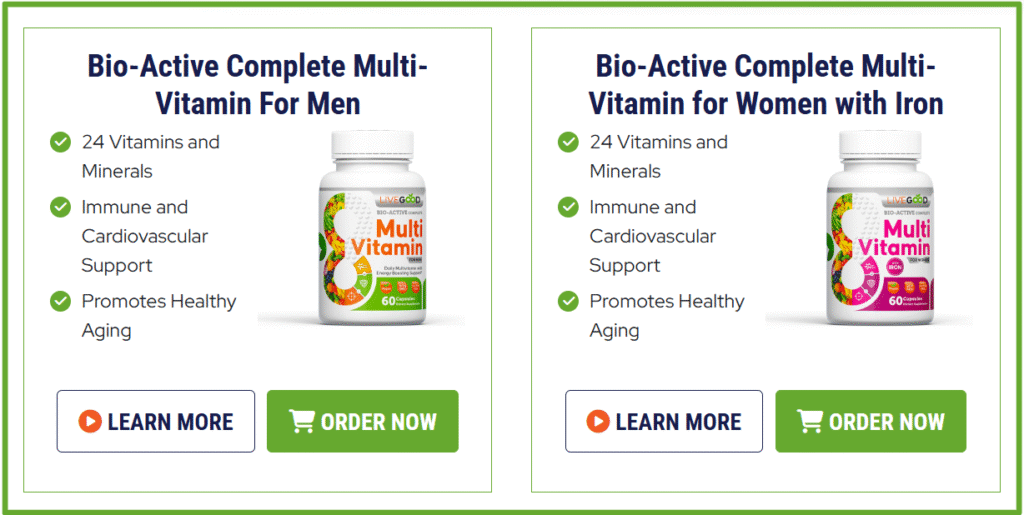
My Experience: This was the first product I tried, and it’s what convinced me to expand my order. I take the men’s formula, and I’ve been genuinely impressed. After about three weeks, I noticed sustained energy throughout the day without the jittery feeling I’d get from my previous multivitamin that was heavy on synthetic B-vitamins.
What I Like: The formula includes methylated B-vitamins, which are easier for the body to absorb. It contains 24 vitamins and minerals with doses that are substantial but not megadoses. The tablets are relatively easy to swallow, and I haven’t experienced any stomach upset, which was an issue with my previous brand.
Honest Critique: The tablets are still fairly large, which might be challenging for some people. Also, while the formula is comprehensive, it doesn’t include iron (which is actually preferred for men and post-menopausal women, but something to note if you need iron supplementation). One minor downside: the tablets have a distinct taste and scent that isn’t the most appealing when you’re taking them.
Value Assessment: At around $9.95 for a month’s supply (for members) or $16.95 (non members), this is exceptional value. Comparable quality multivitamins typically run $30-45 monthly.
Organic Super Greens
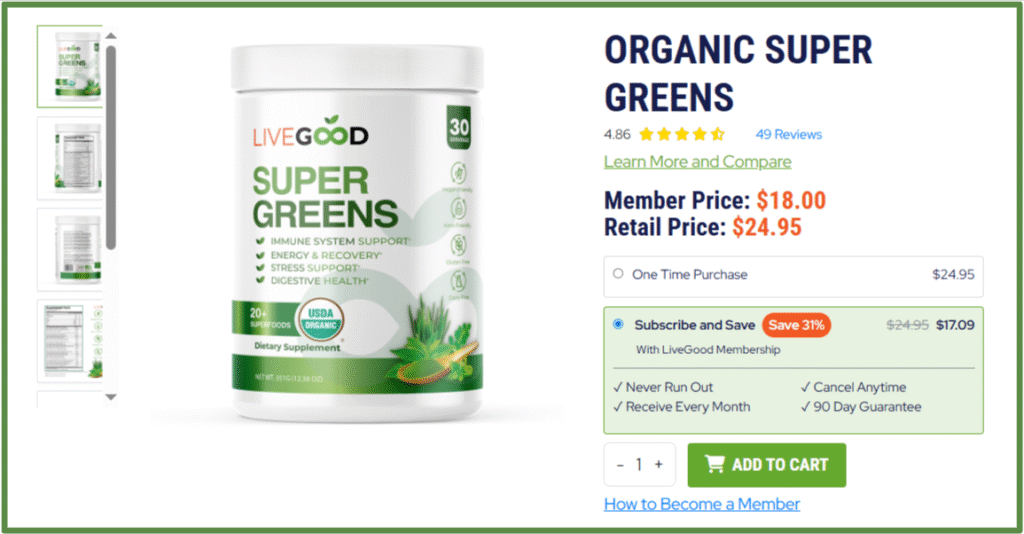
My Experience: This has become part of my morning routine. I mix a scoop in water or add it to my smoothie. The taste is… well, it tastes like greens. It’s not delicious, but it’s not as harsh as some powdered greens I’ve tried. I’d describe it as earthy with a slight sweetness from the monk fruit.
What I Like: The ingredient list is impressive: organic spirulina, chlorella, wheatgrass, barley grass, plus a blend of fruits and vegetables that totals 10 servings worth. I’ve noticed my digestion has improved significantly—I’m more regular and feel less bloated. My skin also seems clearer, though I can’t say definitively if it’s solely from this product. The organic certification gives me confidence about quality.
Honest Critique: If you’re sensitive to taste, you’ll definitely want to mix this with something. Drinking it straight in water is doable but not enjoyable. Also, while the serving size provides a good amount of greens, it’s not a replacement for eating actual vegetables—it’s a supplement to a healthy diet. Some greens powders on the market have more extensive ingredient lists, though they’re typically twice the price.
Value Assessment: At approximately $18 for 30 servings, this is competitive with mid-tier greens powders and significantly cheaper than premium brands like Athletic Greens (now AG1), which runs over $80 monthly.
Organic Super Reds
My Experience: I alternate between Super Greens and Super Reds throughout the week. The flavor profile is much more pleasant—berry-forward with natural sweetness. I genuinely look forward to my “reds” days.
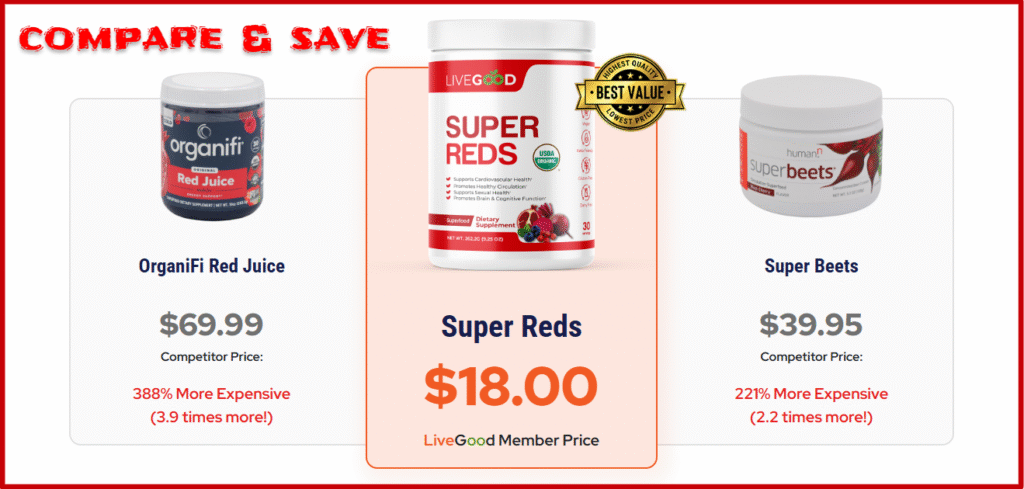
What I Like: The antioxidant content is substantial, featuring berries, beets, and pomegranate. I feel like this complements the greens perfectly. After adding this to my routine, I noticed I was recovering faster from workouts—less muscle soreness and better stamina. The beet content may be contributing to better circulation; I definitely feel more energized during cardio sessions.
Honest Critique: While the taste is better than the greens, it’s still not a “delicious treat.” Some people might find it a bit tart. The powder can clump if you don’t shake or blend it thoroughly. Also, fair warning: beets can change the color of your urine slightly, which can be alarming if you’re not expecting it (it’s harmless).
Value Assessment: At around $18 for 30 servings, this is excellent value. Many single-ingredient beet powders alone cost this much, and this includes a much broader spectrum of antioxidants.
Ultra Magnesium Complex
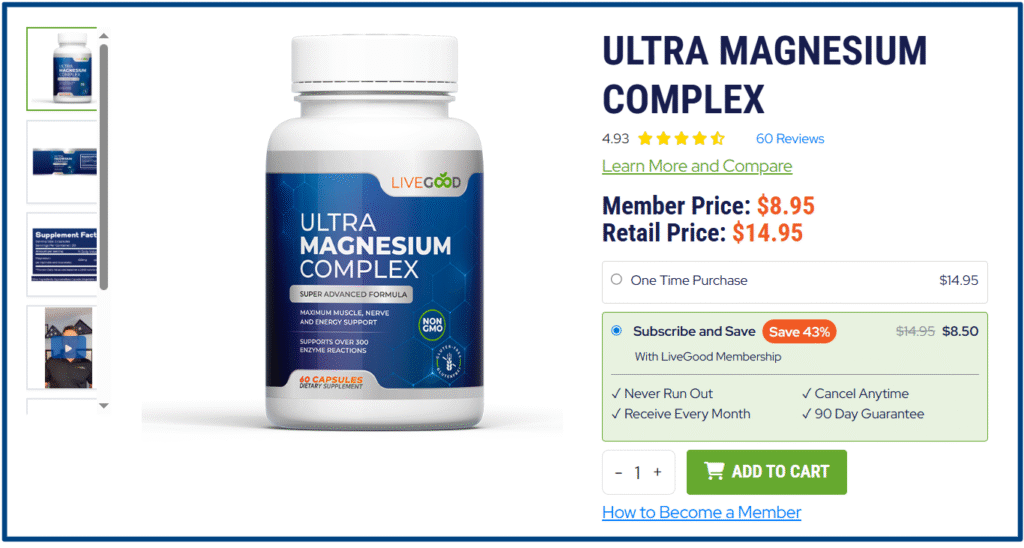
My Experience: This has been a game-changer for my sleep quality. I take it about an hour before bed, and I fall asleep faster and sleep more deeply. I also noticed my muscle cramps after exercise have virtually disappeared.
What I Like: The formula includes seven different forms of magnesium, which is significant because different forms serve different functions in the body. For example, magnesium glycinate is great for relaxation and sleep, while magnesium malate supports energy production. Most single-form magnesium supplements only give you one benefit; this covers multiple bases. The capsules are easy to swallow, and I haven’t experienced any digestive issues (magnesium can cause upset stomach or diarrhea in some forms).
Honest Critique: At two capsules per serving, you’re getting about 500mg of elemental magnesium. While this is a good dose, some people might need more or less depending on their deficiency level and individual needs. Also, because it’s quite relaxing, I wouldn’t recommend taking it before driving or operating machinery. The bottle doesn’t have as clear labeling about this as I’d like.
Value Assessment: Around $15 for a month’s supply is very reasonable. Single-form magnesium glycinate supplements from quality brands typically run $18-25 monthly, and this gives you seven forms.
Organic Vitamin D3-K2 (2000 IU)
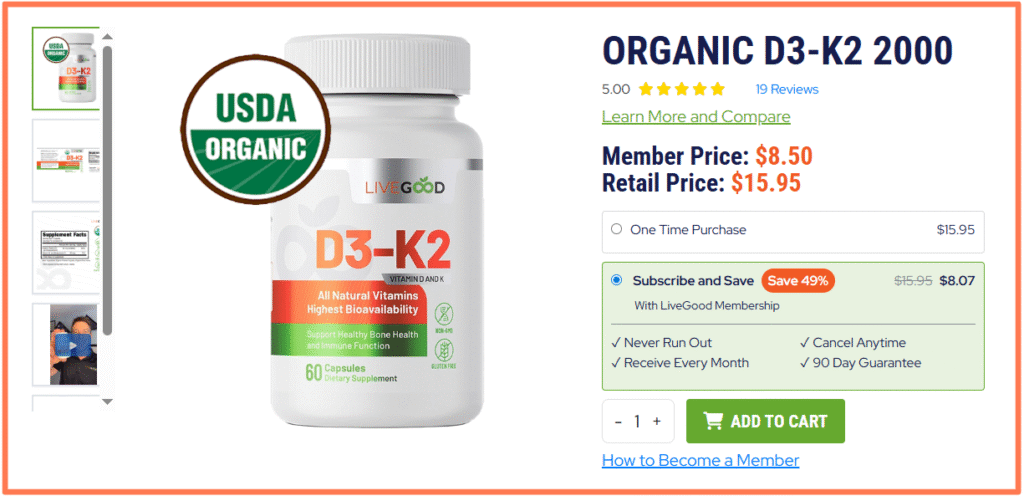
Did you know that Vitamin D is one of the most important vitamins our bodies need to maintain a healthy immune system? Did you also know that more people are deficient in Vitamin D than ANY other vitamin on the planet?
Even though our bodies make Vitamin D in response to sunlight, most people aren’t getting enough sunlight on a daily basis to maintain healthy levels of Vitamin D. And since very few foods contain Vitamin D, it’s very common for so many of us to be deficient. Without enough Vitamin D on a daily basis, our immune systems are weakened, our bone density is compromised, and our bodies are much more vulnerable to sickness and disease.
LiveGood’s Vitamin D3 and K2 with 2,000 units of D3 gives your body the highest quality Vitamin D available anywhere, at optimal levels so you get the most out of every dose. Scientifically formulated with Vitamin K2 not only supports the function of Vitamin D, but also helps to ensure that calcium reaches the bones to maintain healthy bone density, and to help maintain healthy blood and heart function.
My Experience: Living in the Bahamas, you’d think I’d get plenty of vitamin D from the sun. However, my lifestyle involves a lot of indoor work, and I use sunscreen religiously when outdoors (skin cancer prevention is important!). Despite the warm climate, the blood work of a friend showed D levels were actually in the “sufficient but low” range. I recommended they take this daily, and their recent blood work showed their D levels are finally in the optimal range.
What I Like: The combination of D3 and K2 is important—K2 helps direct calcium to your bones rather than soft tissues, making it a smarter formulation than D3 alone. At 2000 IU, it’s a moderate, safe daily dose for most people. The softgels are small and easy to swallow.
Honest Critique: Some people need higher doses of vitamin D (5000 IU or more) depending on their deficiency levels. The 2000 IU dose is good for maintenance, but if you’re significantly deficient, you might need to supplement with additional D3 initially. I’d recommend getting blood work done to know where you stand. Also, this product isn’t unique—many brands offer D3-K2 combinations at similar price points.
Value Assessment: At roughly $10 for a two-month supply, this is quite affordable. It’s comparable to or slightly cheaper than most quality D3-K2 supplements.
Factor 4 (Inflammation Support)
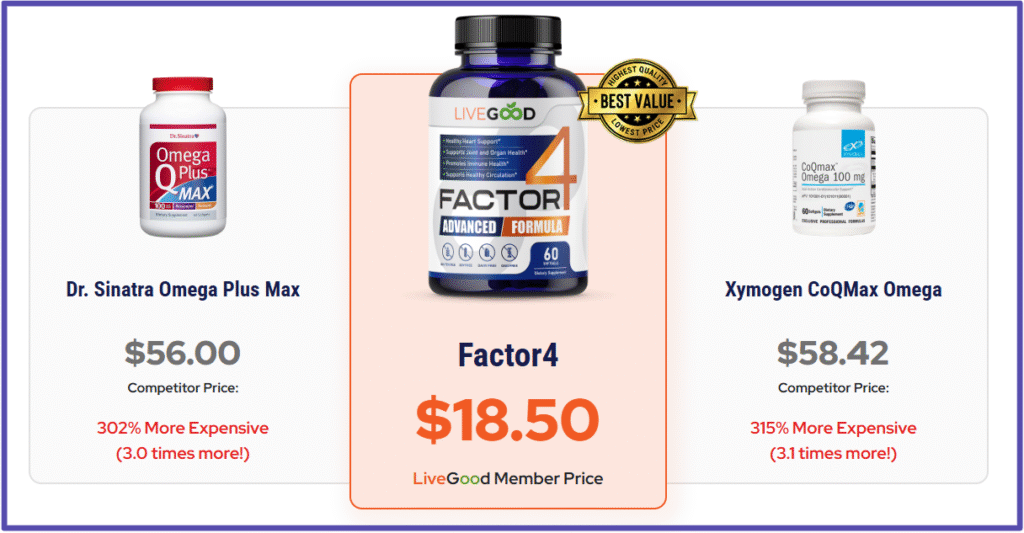
Chronic Inflammatory Diseases are the Number 1 cause of sickness and death in the world! In fact, more than 50% of ALL deaths can be attributed to inflammation related diseases such as heart disease, stroke, cancer, diabetes, arthritis, kidney and liver diseases, and more.
Proudly formulated by one of the world’s top immunologists, LiveGood’s Factor 4 is an Inflammation Management supplement formulated with 4 of the world’s most powerful anti-inflammatory ingredients; Fish Oil, Turmeric, Coenzyme Q10, and Garlic, to help you CONTROL and even REVERSE inflammation!
My Experience: I added the “Factor4 Advanced Inflammation Management capsules” to my routine about three months in, primarily for joint support. I’m in my late 40s and was starting to feel some stiffness in my lower back, especially after workouts.
What I Like: The formula combines turmeric (with black pepper for absorption), boswellia, and other anti-inflammatory botanicals. After about three weeks of consistent use, I noticed my joint discomfort decreased noticeably. I can get through leg day without the persistent ache I used to have the next day. The capsules are relatively small for an herbal supplement.
Honest Critique: Inflammation support supplements generally take time to work—this isn’t a pain reliever you feel immediately. If you’re looking for instant results, this will disappoint you. Also, while I’ve personally noticed benefits, inflammation is complex, and supplements work differently for everyone. Some people might not notice as dramatic a difference. The turmeric can cause a slight yellow tinge to your fingers if you break the capsules (I learned this the hard way), so take them whole.
Value Assessment: At approximately $16 monthly, this is good value compared to buying separate turmeric and boswellia supplements, which could easily cost $25-30 combined.
Methylene Blue Nootropic
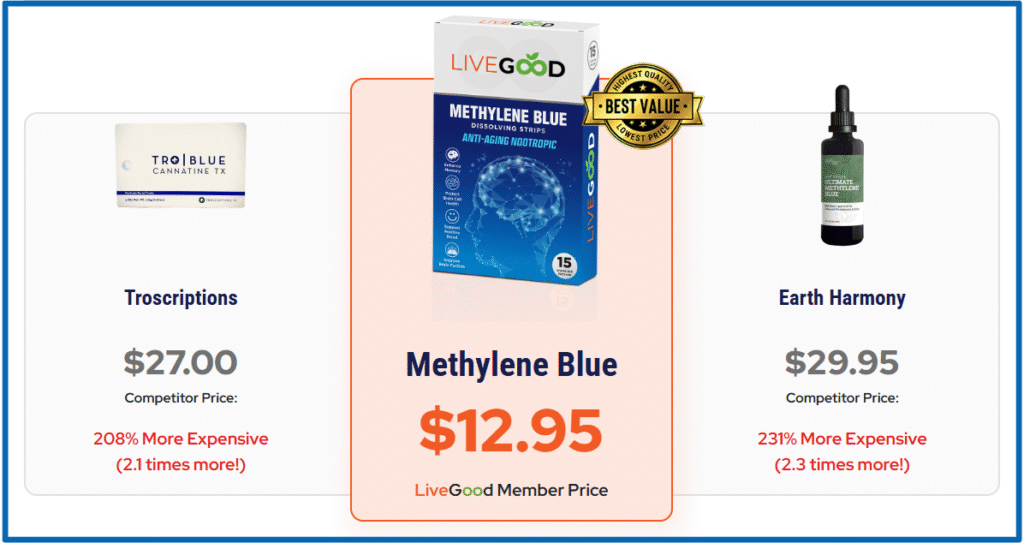
When we’re young, our brains are sharp, we have mental clarity, strong memory, creative problem-solving ability, and healthy mitochondrial energy levels. Mitochondria are the energy producing centers of our brain cells…the powerhouse of our cells.
But as we age, those mitochondrial energy levels decline, and so does our attention, our memory and our mental clarity and agility. In other words, our brain starts degenerating. This normally starts between ages of 30 and 40, however, as we are a product of the food we eat, our lifestyle habits and our environment can also affect how early or late our brain starts to degenerate.
A Nootropic is something that can improve our mental skills like memory, mood and longevity. And Methylene blue is extremely unique in its ability to increase the amount of oxygen that is delivered to our brain cells which improves the energy producing factories in those cells; our mitochondria!
Methylene Blue is widely known as a super-charger for your biology at the cellular level because of its profound effect on mitochondria and energy production. In fact, it’s been used around the world for almost 200 years, AND is recognized by the World Health Organization on the list of Essential Medicines.
My Experience: I have to be honest here—this is the one LiveGood product I do not recommend, despite it potentially having cognitive benefits. I tried it because I was curious about nootropics and the science behind methylene blue for mental clarity and focus.
The Major Problem: It turns everything blue. And I mean EVERYTHING. Your teeth, tongue, gums, mouth, urine—all blue. It’s not a subtle tint; it’s a bright, obvious blue that looks alarming. I took it in the morning before a business meeting and spent the entire meeting self-conscious about my blue-stained mouth. Even after brushing my teeth multiple times, the staining persisted for up 2 days.
I tried it a few more times thinking maybe I could find a workaround, but there’s really no way around it. It can not be taken at night because Methylene Blue is considered photo-dynamic which means it has a response to light and further increases the production of energy within the Mitochondria. As a result, within 30 minutes of using, you must seek natural sunlight for at least 5 minutes of exposure.
What About the Benefits?: To be fair, the product might actually work as intended. Methylene blue has some interesting research behind it for cognitive function and neuroprotection. I did feel somewhat more focused and alert on the days I took it. But honestly, the cosmetic issue is so significant that I couldn’t continue using it long enough to properly assess the cognitive benefits.
Why This Matters: Unless you work from home and don’t see anyone for several hours after taking it, this product is impractical for daily use. If you have any meetings, video calls, social interactions, or need to go anywhere in public, the blue staining is a deal-breaker. I’ve talked to other members who had the same experience—they wanted to like it, but the blue mouth situation makes it unusable in real-world scenarios.
My Verdict: This is one product I skip entirely now. The theoretical benefits aren’t worth the practical inconvenience and embarrassment of walking around with a bright blue mouth. LiveGood has so many other excellent products that I’d recommend focusing on those instead.
Value Assessment: The price is reasonable, but it doesn’t matter how affordable something is if you can’t actually use it in your daily life without looking like you’ve been eating blue popsicles all day.
Additional LiveGood Products I Have Tried
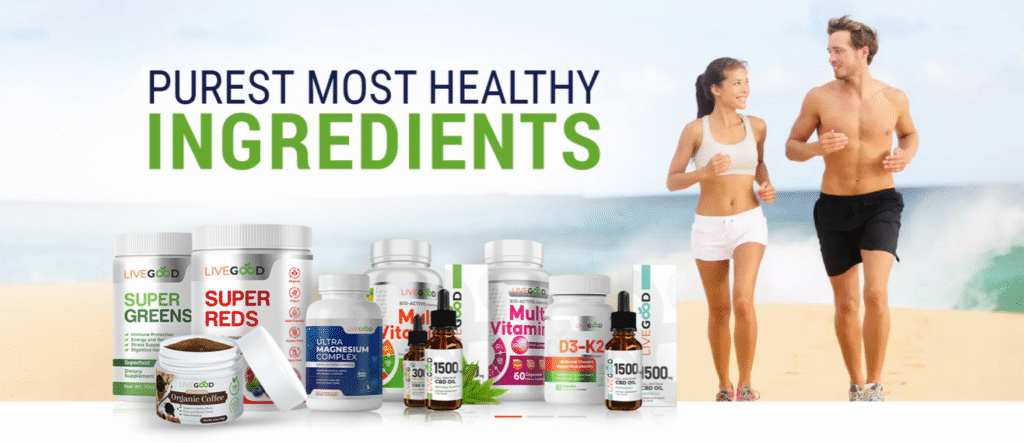
Collagen Peptides
- Formula: Types I & III collagen + Velositol™, Polynol™, ApresFlex™.
- Benefit: Skin, hair, joints, muscle recovery.
- My take: Noticeable difference in joint comfort after a month.
Organic Mushroom Coffee
- Formula: Coffee + mushrooms (lion’s mane, reishi) + maca.
- Benefit: Focus, mood, appetite support.
- My take: Tastes good, clean energy, cheaper than boutique brands. However it didn’t mix well, there was always residue to the bottom of mug.
Himalayan Shilajit & Organic Sea Moss
- Formula: Mineral-rich botanicals for hormone/thyroid support.
- My take: Subtle but steady vitality boost.
Chlorophyll & Zeolite Detox
- Formula: Chlorophyll + zeolite for toxin binding.
- My take: Good “detox hygiene” add-on when diet isn’t perfect.
Vitality (Men’s Performance Support)
- Formula: Herbal blend for stamina, libido, energy.
- My take: Helps when paired with sleep and training, but not a magic pill.
Click Here: To Get a Full Listing of LiveGood Products
What About the Science?
Here’s where I need to be transparent: LiveGood doesn’t have published clinical trials on their specific formulations. What they do have are quality ingredients that are individually supported by research. For example, the forms of magnesium they use have scientific backing, and turmeric’s anti-inflammatory properties are well-documented.
Are these formulations revolutionary? No. Are they solid, well-designed supplements using quality ingredients at an excellent price point? Absolutely.
I would love to see third-party testing certifications like NSF or USP verification, which would provide additional quality assurance. This is an area where more established supplement brands sometimes have an advantage.
The MLM Elephant in the Room
I need to address this because it’s a significant part of what makes LiveGood different from traditional supplement companies. Yes, LiveGood is an MLM, and I know that comes with a lot of baggage and skepticism—some deserved, some not.
Here’s my honest take after eighteen months: I do participate in the business opportunity side of LiveGood, and I believe it can be a legitimate way to earn income if approached correctly. But let me be very clear about what that means and doesn’t mean.
The Reality of the Business Opportunity:
After a year and a half, I do make money with LiveGood, but it didn’t happen overnight, and it required genuine effort. I’m not driving a Lamborghini or claiming I got rich quick—anyone who promises you that is being dishonest. What I have done is built a modest supplemental income stream from this company by sharing products I genuinely use and believe in.
Here’s what’s made it work for me:
- I only share with people who have expressed interest in health and wellness
- I lead with the products, not the business opportunity
- I’m transparent about my experience—both what I love and what I don’t (like that Methylene Blue!)
- I focus on helping people find products that actually benefit them, not just making a sale
The Honest Truth You Need to Know:
Most people who join MLMs don’t make significant money—that’s a statistical fact across the entire industry. Success requires:
- Genuine belief in and use of the products
- Consistent effort over time (months, not weeks)
- Good communication skills and authenticity
- Being comfortable with rejection (not everyone will be interested)
- Treating it like a real business, not a hobby
I’m not going to sugarcoat it: if you join just to make quick money without caring about the products, you’ll likely fail and possibly annoy your friends and family in the process. That’s what gives MLMs a bad reputation.
My Personal Approach:
I share my real experience—including the fact that the Methylene Blue turns your mouth blue, or that the Super Greens taste like, well, greens. This authenticity has actually helped me build trust. People appreciate honesty over hype.
I’ve earned enough to cover my own product costs and then some, which means I essentially get my supplements for free plus a bit extra. For others I’ve worked with who put in more effort, they’ve replaced full time job income. Is it possible for the “average person” to earn supplemental income? Yes, if you’re realistic and put in the work.
My Recommendation on the Business Side:
- Start as a customer first. Use the products for at least 2-3 months before considering the business opportunity. You can’t authentically share something you haven’t experienced.
- Be honest about results. Share what works AND what doesn’t. Your credibility matters more than a single sale.
- Don’t pressure people. If you have to convince someone, they’re not your customer. Focus on people who are already interested in health and wellness.
- Understand the numbers. Most of your income will likely come from personal sales to people who genuinely want the products, not from building a huge downline.
- Don’t quit your day job. Treat this as supplemental income until (and unless) it proves to be more than that.
- Be prepared for skepticism. The MLM model turns people off, and that’s okay. Focus on those who are open-minded.
The Bottom Line on the Business:
Is the LiveGood business opportunity legitimate? Yes, in my experience, it is—but “legitimate” doesn’t mean “easy” or “guaranteed.” It means you can earn money if you work at it ethically and consistently.
Should everyone join for the business? Absolutely not. I’d say only about 20% of people should even consider it—those who genuinely love the products, are comfortable with sales, and understand they’re building a business, not getting a get-rich-quick scheme.
For the other 80%? Just enjoy the products at wholesale prices. There’s zero shame in being a customer-only member. In fact, that’s probably the smarter choice for most people.
Who Should Consider LiveGood?
Great fit for:
- People currently taking multiple supplements who want to save money
- Those seeking quality ingredients without luxury brand markup
- Health-conscious individuals looking for organic options
- Anyone comfortable with a monthly membership model (think Costco for supplements)
Probably not ideal for:
- Casual supplement users who only take one product occasionally
- People who strongly oppose MLM business models on principle
- Those seeking supplements with extensive third-party testing certifications
- Individuals who need specialized, therapeutic-grade supplements for specific medical conditions
Tips for Getting Started With LiveGood Products

If you decide to try LiveGood Products, here’s my advice:
- Unlock your FREE Personalized Health Assessment – Discover exactly what your body needs.
- Start with 1-2 products that address your primary health goals rather than ordering everything at once.
- Give it time. Most nutritional supplements need 3-4 weeks of consistent use before you notice benefits.
- Track your experience. I keep a simple journal noting energy levels, sleep quality, and how I feel. It helps me assess whether products are actually making a difference.
- Get blood work done if possible, especially for things like vitamin D and magnesium levels. It’s satisfying to see objective improvements.
- Don’t expect miracles. These are supplements, not medications. They support health; they don’t cure diseases.
- Be skeptical of income claims if anyone approaches you about the business side. Focus on whether you like the products.
My Bottom Line: Final Thoughts on This LiveGood Products Review
After eighteen months, I’m still a happy customer and plan to continue my membership. The products work well for me, the price is right, and I appreciate the convenience of getting multiple supplements from one source.
Are LiveGood products the absolute best on the market? Probably not—there are certainly luxury brands with more bells and whistles. But are they high-quality, effective, and excellent value? In my experience, absolutely yes.
The biggest barrier for most people will be the MLM structure and membership fee. I get it—those are legitimate concerns. My perspective is that if you can look past the business model and focus on the products themselves, there’s genuine value here for regular supplement users.
I’ve tried many supplement brands over the years, from bargain-basement drugstore options to premium boutique brands. LiveGood sits in a sweet spot: quality ingredients and effective formulations at prices that don’t require taking out a second mortgage.
This LiveGood products review represents my genuine experience—the good, the bad (hello, Methylene Blue!), and everything in between.
Final Recommendation: Should You Try LiveGood Products?
If you’re spending $40+ monthly on supplements from various brands, LiveGood is worth considering based on this LiveGood products review. Start with their multivitamin or one of the greens/reds formulas. Give it a fair trial of 30-60 days, and see how you feel.
Just remember: supplements support health; they don’t create it. Continue eating well, exercising, sleeping adequately, and managing stress. LiveGood products can be a valuable part of a healthy lifestyle, but they’re not a substitute for foundational health habits.
👉 Ready to see for yourself?
Click here to explore LiveGood products at member pricing — membership pays for itself if you buy even one or two products monthly.
And if you’d like to understand the business side of LiveGood, check out my posts on the LiveGood compensation plan and the owners behind LiveGood and my complete LiveGood MLM Review.
Disclosure: I am a LiveGood member and purchase these products for personal use. I am not compensated for this review, and these opinions are genuinely my own based on my experience. Your results may vary, and you should always consult with healthcare providers before starting any new supplement regimen.